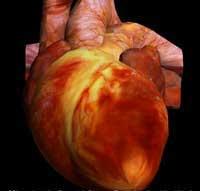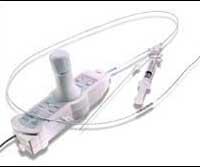Pharmacogenetics for heart problems
2001/04/27 Galarraga Aiestaran, Ana - Elhuyar Zientzia
When coronary artery calibre is closed or prevented, serious problems such as myocardial infarction or angina appear. The most common solution is angioplasty, that is, arterial cleansing with a probe. However, after six months, some patients again tighten the blood vessels as before. To avoid this, during angioplasty, a tubular metallic prosthesis is introduced.

Four years ago, Philippe Amouyel and his team demonstrated that patients who have a certain form (genotype DD) of a gene that controls an enzyme (ACE or angiotensin conversion enzyme) had four times more risk of suffering problems after angioplasty, although these patients had sterilized. The degree of enzyme in blood in these patients is superior to that of other genetic features. Faced with this situation, they thought that treatments with ACE inhibitors could be effective. These treatments are frequent against hypertension.
However, they obtained an unexpected result and ACE inhibitors saw an increase in the risk of suffering problems after angioplasty in a study with 91 patients. All had DD genotype and angioplasty was accompanied by prostheses. They were divided into two groups: the first ones were given quinapril, a molecule that inhibits the gene that produces ACE; the second only gave them a placebo. They were analyzed for six months and inhibitors saw they had more problems. In fact, the diameter of the arteries of these patients was reduced more than that of the control group. As an explanation of the results, the researchers proposed that the inhibitory inflammation caused by the prosthesis increases.
Consequently, researchers warn that the usual treatment in patients with DD genotype is harmful. They also point out that treatment should be adjusted to the genetic characteristics of patients.

Gai honi buruzko eduki gehiago
Elhuyarrek garatutako teknologia






